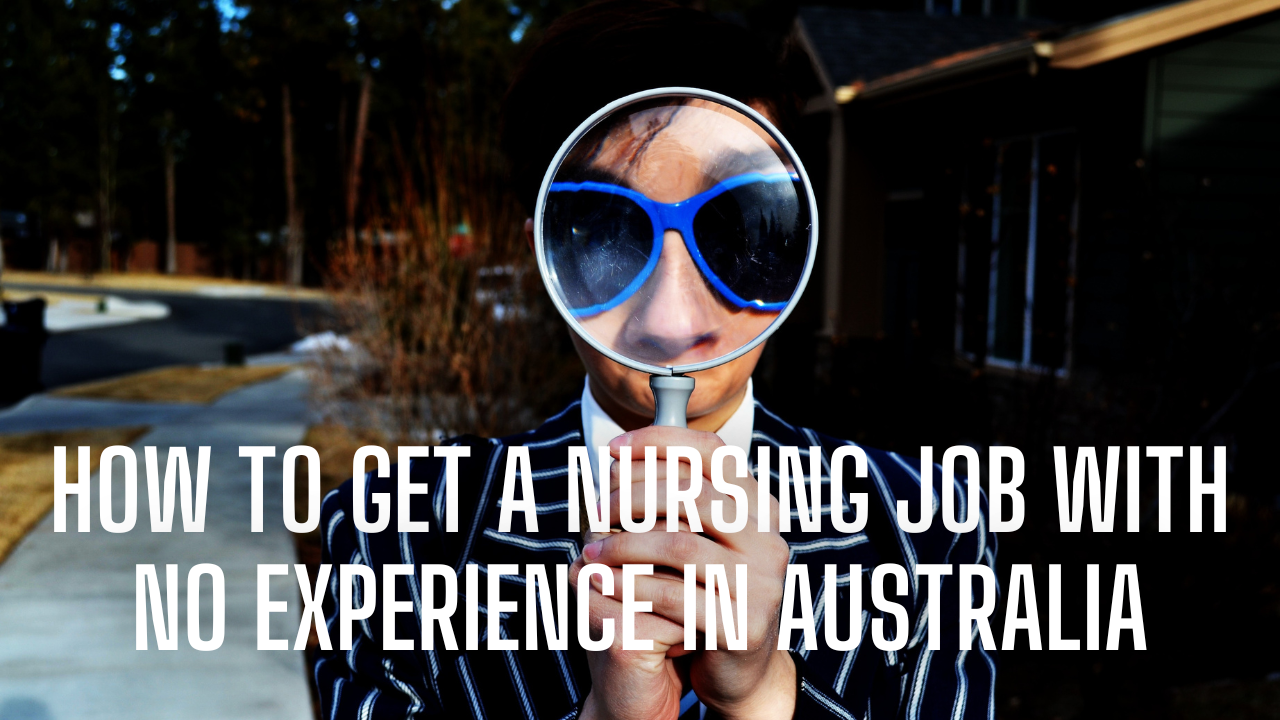Table of Contents
How to Get a Nursing Job With No Experience in Australia
So you want to be a nurse in Australia but don’t have any experience? Don’t worry – it’s not impossible!
There are many ways to get your foot in the door, and this article will provide you with some tips on how to make it happen.
The nursing industry is growing rapidly in Australia, so there are plenty of opportunities available for new graduates.
Keep reading for advice on how to find a job, how to prepare for interviews, and more!
How To Become A Nurse In Australia
There are many different paths that you can take to become a nurse in Australia.
The most common route is to complete a nursing degree at a university, however, there are also diploma and certificate courses available. Once you have completed your studies, you will need to register with the Australian Health Practitioner Regulation Agency (AHPRA) before you can begin working.
If you are already registered as a nurse in another country, you may be eligible for registration in Australia.
You need to meet the criteria for registration with the Nursing and Midwifery Board of Australia (NMBA) and the Australian Health Practitioner Regulation Agency (AHPRA).
There are five criteria:
1) Proof of identity
2) English language proficiency
You must pass the required score in one of these tests:
- The International English Language Testing System (IELTS) – 7 in each of the four components – listening, reading, writing and speaking.
- Occupational English Test (OET) for Nurses – B in each of the four components – listening, reading, writing and speaking.
- Pearson Test of English (PTE) Academic – 65 overall AND 65 in each of the four communicative skills – listening, reading, writing and speaking.
- Test of English as a Foreign Language (TOEFL) iBT – 94 AND the following minimum scores in each section of the test – 24 listening, 24 reading, 27 writing and 23 speaking.
3) Meet Australian nursing and midwifery education standards.
You are likely to fulfill the comparable qualification as an Australian registered nurse if you have a bachelor’s degree (level 7) or higher in one of the following countries, as well as registered as a nurse:
- Canada
- Hong Kong
- the Republic of Ireland
- the United Kingdom
- New Zealand
- the United States of America
According to the NMBA, these foreign nursing qualifications may allow nurses to practice in Australia:
- Belgium Flanders
- Chile
- Pakistan
- Papua New Guinea
- Singapore
*If you only have a diploma from one of the countries listed above, you will require an assessment of your further education or experience to determine if you are deemed to be equivalent to a nurse qualified in Australia.
Nurses from countries not listed above will require an individual assessment to determine whether their qualifications and experience will be recognised by the Board.
All applicants must provide a graduation certificate and basic transcripts.
4) Professional Practice
You must provide evidence of having practised as a registered nurse or midwife in the five years prior to submitting your application.
You will be required to submit professional references that must meet the following criteria:
- Be on official letterhead
- Be written by a direct supervisor who is a registered nurse or midwife
- Be dated
- Contain an official signature
5) Prove that you are capable of practising in Australia.
You must prove that there have been no previous disciplinary proceedings against you, that there are no restrictions on you arising from mental incapacity, that there are no restrictions on you arising from physical incapacity, and that you have no criminal history which would preclude you from working as a registered nurse or midwife in Australia.
Is it Hard to Get Your First Nursing Job?
The nursing field is full of opportunities. With an aging population and advancements in medical care, the demand for nurses is higher than ever.
So, you would think that landing your first job would be a piece of cake, right? Well, not exactly.
While there are many opportunities for nurses, there is also a lot of competition. Even though you may have graduated top of your class and have your dream job lined up, it’s still not a guarantee that you’ll get the job.
So, what can you do to improve your chances of landing your first nursing job? Start by building up your experience. If you’re still in nursing school, try to land a position as a nursing assistant or join a shadowing program.
The more experience you have, the better your chances will be of getting your first nursing job. And who knows, maybe your first nursing job will be your dream job after all.
Types of Nursing Jobs That Don’t Require Experience

Although most nursing jobs do require some level of experience, there are a few exceptions.For example, many hospitals are always in need of student nurses to help with things like personal care, checking vital signs and documentation.
Additionally, home care/community care agencies are often willing to hire new nurses without any experience – becoming a home health nurse is an excellent way to gain experience without being subjected to the fast-paced hospital environment.
Of course, these types of positions usually come with some on-the-job training. However, they can be a great first step for someone who is looking to get their foot in the door of the nursing profession.
So, if you’re a recent graduate of a nursing program or simply looking for a change, don’t rule out a job in nursing just because you don’t have any experience.
With a little effort, you may be surprised at what you can accomplish.
Tips On How To Get A Nursing Job With No Experience
Now that we’ve addressed some of the issues surrounding finding a nursing job with no experience, let’s dive into some tips on how to navigate these issues to land a job.
Find the Right Job For You

Do some research and figure out what area of nursing you’re interested in.
There are many different options available, from working in a hospital to aged care.
It’s important to do your research and figure out which area interests you the most – this will make your job search much easier!
Once you’ve decided on the type of nursing job you want, you can start looking into specific positions. For example, if you’re interested in working in a hospital, you can search for hospital positions online or through a nursing agency.
Do You Have The Right Qualifications?
Before you start applying for jobs, it’s important to make sure you have the right qualifications.
Read through the job advertisements/description and check what qualifications are required.
If you have them, great! you can move on to the next step of the application process. If not, identify the gaps and start working on filling them.
Work On Your Resume And Cover Letter

When it comes to nursing resumes, employers are looking for evidence of your clinical skills and experience.
Be sure to list any nursing schools you’ve attended and courses you’ve taken, as well as any clinical rotations or practicums you’ve completed.
If you have any nursing licenses or certifications, be sure to list them as well.
Your resume should also highlight any relevant work experience, whether it’s in a nursing role or not.
If you have any other professional experience that’s relevant to nursing, such as customer service or caregiving, be sure to mention it.
Here are some further tips:
- Use keywords that relate to the nursing profession, such as registered nurse, nursing school, and experienced nurse. This will help your resume and cover letter appear higher in search results when potential employers are looking for candidates.
- Use strong action verbs to describe your skills and experiences, such as “assisted,” “monitored,” and “coordinated.” This will help to paint a picture of what you’re capable of in the workplace.
- Highlight any relevant experience you have, even if it’s not in a nursing setting. For example, if you have experience working with patients or in customer service, that can be beneficial in a nursing role.
- Be concise and clear in your writing. Avoid using nursing jargon that potential employers may not understand. Remember, you want them to be able to easily see why you’re qualified for the job.
Your cover letter is your chance to sell yourself to potential employers.
In your letter, be sure to mention:
- Why you’re interested in nursing and what qualities you have that would make you a great nurse.
- What benefits you could bring to the employer. Sell your strengths (could be resilience, quick learner, team player, and so on), skills (your nursing skills from previous experience, student placements etc.), and knowledge (about the specific area you are applying for).
Take a look at some nursing specific cover letter examples to get an idea of how to format yours.
If you have any personal connection to the nursing profession, such as if you have a family member who’s a nurse, be sure to mention that as well.
Your cover letter is also a great place to mention any volunteer work or community involvement you have that’s relevant to nursing.
There’s no doubt that a career in nursing can be both fulfilling and rewarding. By taking the time to work on your resume and cover letter, you’re increasing your chances of landing your dream nursing job.
Overcoming Lack of Experience
Being a new graduate nurse can be daunting. You have the added pressure of not only being new to the profession but also having little to no experience.
Many entry-level hospital jobs require at least one year of experience, which can make it difficult to find a job right out of nursing school. The good news is that there are ways to overcome these obstacles.
One way is to look for entry-level positions that do not require experience. These types of positions may be in areas such as a student nurse, labor and delivery nurse, paediatrics, or nursing homes, where the learning curve is not as steep.
Another way to overcome a lack of experience is to volunteer or work as a nurse extern in a hospital setting. This will give you the opportunity to gain valuable hands-on experience and learn from experienced nurses.
By taking the time to research your options and familiarise yourself with the process, you will be well on your way to landing your dream job as a nurse.
Talk to Other Registered Nurses
One of the best ways to learn about how to get a nursing job in Australia with no experience is to talk to other registered nurses. They can offer valuable insights and advice to new nurses based on their own experiences.
If you know any registered nurses, reach out to them and ask if they have any tips or recommendations or job leads.
You can also join online forums or attend nursing career fairs to meet and network with other nurses.
By talking to those who have already gone through the process, you can learn about different job options, how to stand out from the competition, and what to expect during the job search process.
With their help, you’ll be well on your way to landing your first job as a nurse in Australia.
Take Your Time During The Application Process
Applying for nursing jobs can be a time-consuming process.
In addition to completing the online application and submitting a resume and cover letter, you may also need to provide other supporting documents and answer the selection questions/criteria.
It’s better to write down your answers before starting the application because it gives you more time to do your research. You should prepare answers for hospital/organisation-specific questions such as what are their CORE values and demonstrate how you would apply these CORE values in your daily work.
Make sure you take your time when completing these materials/questions and double-check them for grammar and spelling errors.
Once you’ve submitted your application, don’t be afraid to follow up with the hiring manager to ensure they received it and that you’re still being considered for the position.
Following up shows that you’re interested in the job and willing to put in the extra effort. (This step is a game changer. )
The nursing job market in Australia is competitive. However, by taking the time to research your options, familiarise yourself with the process, and talk to other nurses, you’re putting yourself in the best position to land a job.
Prepare Yourself For The Interview Process
Once you’ve landed an interview, it’s time to start preparing. This means more than just coming up with a list of questions to ask the interviewer.
You should also take the time to learn about the company and familiarise yourself with their values and mission statement. This will help you determine if the company is a good fit for you and give you something to talk about during the interview.
In addition to researching the company, you should also spend some time practising your answers to common interview questions.
These may include:
- What are your career goals?
- Why did you become a nurse?
- What are your strengths/weaknesses?
- Tell me about a challenge or conflict you’ve faced at work, and how you dealt with it.
- What is person-centred care?
- Communication skills/Teamwork/Accountability are popular questions.
It is also likely you will be faced with a case study during the interview.
If you do your homework, you will feel more prepared and confident when it comes time to sit down for your interview.
At the end of your interview, the interviewer will ask you if you have any questions to ask them. This is your opportunity to ask them for their feedback and any other question you may have.
This will give you a good indication of how the interview went and if you should expect them to provide you with good news in the future. It’s also a good opportunity for you to know if you need to improve your answers in the future.
Follow Up With Prospective Employers
After your interview, it’s important to follow up with the employer. This can be done with a phone call or an email.
In your follow-up, thank them for their time and reiterate your interest in the position.
This is also an opportunity to address any concerns they may have about your qualifications or experience.
By following up after your interview, you are displaying initiative, energy and a can-do attitude which is important for any successful business professional (This step is a game changer.
Frequently Asked Questions
What types of nursing jobs are available in Australia?
There are a variety of nursing jobs available in Australia, including positions in hospitals, clinics, community health centres, home care, residential care, and private practices. There are also opportunities to work as a nurse educator, researcher, or administrator.
How much does a nurse earn in Australia?
Salaries for nurses vary depending on experience and location. In general, registered nurses start out earning between $60,000 and $65,000 ($30-$33/hour). Experienced nurses can earn up to $100,000 per year.
I personally strongly recommend you consider being a clinical advisor in the aged care/disability care setting. The starting salary is between $75,000-$79,000 ($38-$40/hour). New graduate nurses can apply.
Learn about Australian Government-Funded Aged Care Services and how it works.
I’m not sure if I want to work in a hospital or aged care facility. What are the differences?
Working in a hospital offers the opportunity to work with a variety of patients with different medical needs. (Clinical focus)
Aged care facilities provide care for elderly patients who may need assistance with activities of daily living such as bathing, eating, and dressing. (Clinical, physical, psychological, and social conditions.)
I’m interested in finding a nursing job in Australia, but I don’t have any experience. What should I do?
There are a few options available for nurses who want to work in Australia but don’t have any experience. You can search for a transition program from hospitals or look into working with a nursing agency.
Additionally, it is important to make sure your resume and cover letter are up-to-date and error-free.
Finally, practice your interviewing skills so you will be prepared for any questions an employer may ask.
Conclusion
Getting a nursing job in Australia with no experience can be challenging, but it is possible. By familiarising yourself with the process, doing your research, and preparing for your interviews, you will increase your chances of landing the job you want. Good luck!

Any views and opinions expressed on any blog/article within The Nurse Break website belong solely to the original authors and can’t be attributed to The Nurse Break or its Founder.






You must be logged in to post a comment.